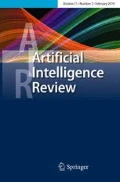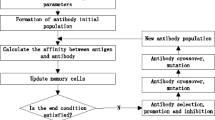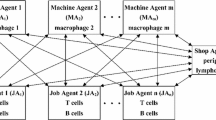Abstract
This article reviews the production scheduling problems focusing on those related to flexible job-shop scheduling. Job-shop and flexible job-shop scheduling problems are one of the most frequently encountered and hardest to optimize. This article begins with a review of the job-shop and flexible job-shop scheduling problem, and follow by the literature on artificial immune systems (AIS) and suggests ways them in solving job-shop and flexible job-shop scheduling problems. For the purposes of this study, AIS is defined as a computational system based on metaphors borrowed from the biological immune system. This article also, summarizes the direction of current research and suggests areas that might most profitably be given further scholarly attention.
Similar content being viewed by others
References
Adams J, Balas E, Zawack D (1986) The shifting bottleneck procedure for job shop scheduling. Carnegie-Mellon University Management Science Research Group, Pittsburgh
Aickelin U, Burke E, Mohamed Din A (2004) Investigating artificial immune systems for job shop rescheduling in changing environments. In: 6th International conference in adaptive computing in design and manufacture, Bristol, UK
Bagheri A, Zandieh M, Mahdavi I, Yazdani M (2010) An artificial immune algorithm for the flexible job-shop scheduling problem. Future Generation Comput Syst 26: 533–541
Baker KR (1974) Introduction to sequencing and scheduling. Wiley, New York
Baptiste P, Le Pape C (1996) A constraint-based branch and bound algorithm for preemptive job-shop scheduling. In: 5th IEE, international symposium on assembly and task planning, Besançon
Bersini H (1991) Immune network and adaptive control in towards a practice of autonomous systems. In: Proceedings of the first European conference on artificial life. MIT Press, Cambridge, pp 217–226
Bersini H, Varela FJ (1990) Hints for adaptive problem solving gleaned from immune networks. Parallel Prob Solv Nat pp 343–354
Bersini H, Varela FJ (1991) The immune recruitment mechanism: a selective evolutionary strategy. In: Proceedings of the international conference on genetic algorithm, pp 520–526
Bruker P, Schlie R (1990) Job-shop scheduling with multi-purpose machine. Computing 45: 369–375
Burnet FM (1978) Clonal selection and after. In: Bell GI, Perelson AS, Pimbley GH (eds) Theoretical immunology. Marcel Dekker Inc, New York, pp 63–85
Chueh CH (2004) An immune algorithm for engineering optimization. Dissertation Tatung University, Taipei
Costa AM, Vargas PA, Von Zuben FJ, Frabca PM (2002) Makespan minimization on parallel processors: an immune-based approach. In: Proceedings of the 2002 congress on evolutionary computation. IEEE Press, pp 920–925
Dausset J (1980) The major histocompatibality complex in man—past, present and future concepts. Nobel Lecturer University of Paris, Paris
Dreher H (1995) The immune power personality. Penguin Books, Baltimore
Fabio F, Maurizio R (2006) Comparison of artificial immune systems and genetic algorithms in electrical engineering. Comput Math Electr Electron Eng 25(4): 792–811
Farmer JD, Packard NH, Perelson AS (1986) The immune systems, adaptation and machine learning. Phys D 22: 87–204
French S (1982) Sequencing and scheduling, mathematics and its applications. Ellis Horwood Limited, Chichester
Gen M, Tsujimura Y, Kubota E (1994) Solving job-shop scheduling problem using genetic algorithms. In: Proceedings of the 16th international conferences on computer and industrial engineering, Ashikaga, Japan, pp 576–579
Giffler B, Thomson G (1960) Algorithms for solving production scheduling problems. Oper Res VIII: 487–503
Hart EJT (2008) Application areas of AIS: the past, the present and the future. Appl Soft Comput 8: 191–201
Hart E, Ross P (1999a) An immune system approach to scheduling in changing environments. In: Banzhaf W, Daida J, Eiben AE, Garzon MH, Honavar V, Jakiela M, Smith RE (eds) Proceeding of the GECCO 1999. Morgan Kaufmann, Los Altos, pp 1559–1565
Hart E, Ross P (1999b) The evolution and analysis of a potential antibody library for job-shop scheduling. In: Corne D, Dorigo M, Glover F (eds) New ideas in optimisation. McGraw-Hill, London, pp 185–202
Hart E, Ross P, Nelson J (1998) Producing robust schedules via, an artificial immune system. In: Proceeding of the ICEC ’98. IEEE Press, Cambridge, pp 464–469
Hermann JW (2006) Improving production scheduling: integrating organizational, decision-making, and problem-solving perspectives. In: Industrial Engineering Research Conference, Orlando, Florida
Hoffman GW (1986) A neural network model based on the nalogy with the immune system. J Theor Biol 122: 33–67
Ishida Y (1990) Fully distributed diagnosis by PDP learning algorithm: towards immune network PDP model. In: Proceedings of the international joint conference on neural networks, pp 777–782
Ishida Y (1993) An immune network model and its applications to process diagnosis. Syst Comput Jpn 24(6): 646–651
Janeway CA Jr (1992) The immune system evolved to discriminate infectious nonself from noninfectious self. Immunol Today 13(1): 11–16
Jensen MT (2003) Generating robust and flexible jobshop schedules using genetic algorithms. IEEE Trans Evol Comput 7(3): 275–288
Jerne NK (1973) The immune system. Scientif Am 229(1): 52–60
Kacem I, Hammadi S, Borne P (2002) Approach by localization and multiobjective evolutionary optimization for flexible job-shop scheduling problems. IEEE Trans Syst Man Cybern 32(1): 1–13
Land AH, Doig AG (1960) An automatic method of solving discrete programming problems. Econometricca 28(3): 497–520
Luh GC, Chueh CH (2007) Job shop optimization using multi-modal immune algorithm. In: Okuno HG, Ali M (eds) IEA/AIE 2007, LNAI 4570. Springer, Berlin, pp 1127–1137
Ong ZX, Tay JC, Kwoh CK (2005) Applying the clonal selection principle to find flexible job-shop schedules. LNCS 3627: 442–455
Pinedo M (2002) Scheduling: theory, algorithms and systems. Prentice-Hall, Englewood Cliffs
Pezzella F, Morganti G, Ciaschetti G (2008) A genetic algorithm for the flexible job-shop scheduling problem. Comput Oper Res 35(10): 3202–3212
Roshanaei V, Naderi B, Jolai F, Khalili M (2009) A variable neighborhood search for job shop scheduling with set-up times to minimize Makespan. Future Generation Comput Syst 25: 654–661
Tarlinton D (1998) Germinal centers: form and function. Curr Oper Immune 10: 245–251
Tay JC, Ho NB (2004) GENACE: an efficient cultural algorithm for solving the flexible job-shop problem. In: Proceedings of the IEEE congress of evolutionary computation, pp 1759–1766
Tomoyuki M (2003) An application of immune algorithms for job-shop scheduling problems. In: Proceedings of the 5th international symposium on assembly and task planning, pp 146–150
Weissman IL, Cooper MD (1993) How the immune system develops. Scientif Am 269(3): 33–40
Wiers V (1997) Human-computer interaction in production scheduling-Analysis and design of decision support systems for production scheduling tasks. Dissertation Eindhoven University of Technology, Eindhoven
Author information
Authors and Affiliations
Corresponding author
Rights and permissions
About this article
Cite this article
Muhamad, A.S., Deris, S. An artificial immune system for solving production scheduling problems: a review. Artif Intell Rev 39, 97–108 (2013). https://doi.org/10.1007/s10462-011-9259-1
Published:
Issue Date:
DOI: https://doi.org/10.1007/s10462-011-9259-1




